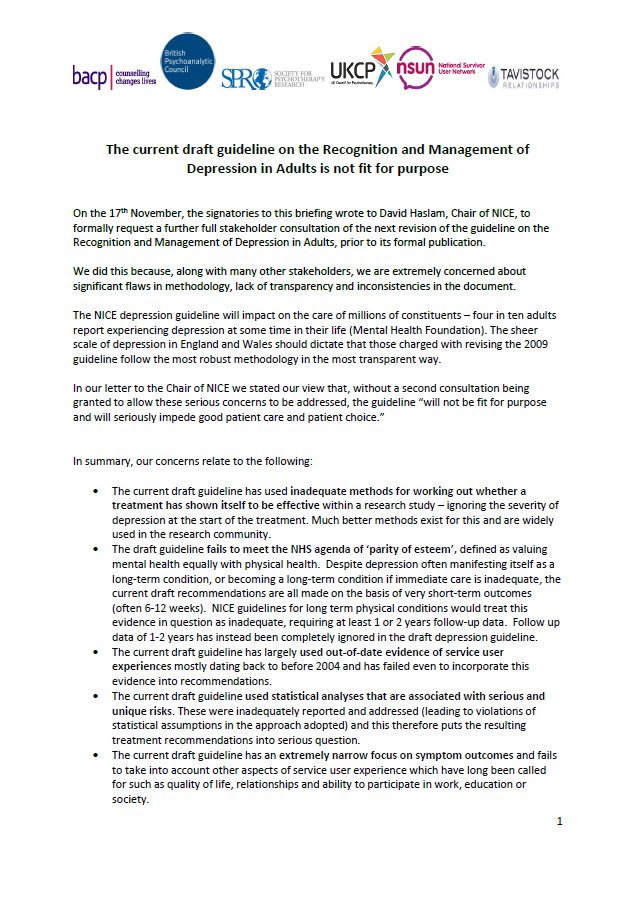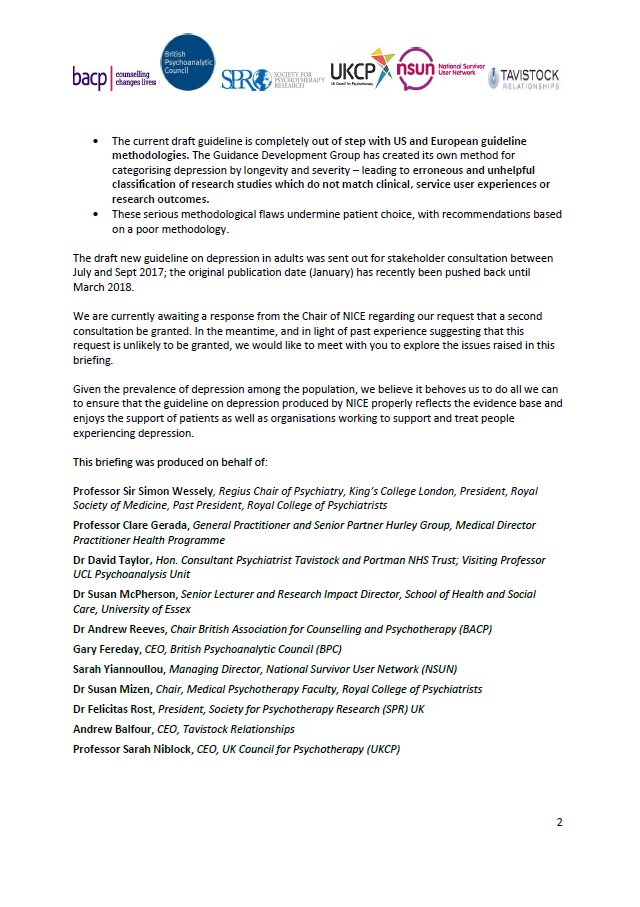These are the 8 major errors they claim are in the NICE guideline, copied from the screen shot of Box 2 in one of the tweets. They are listed as bullet points. I have numbered them:
The NICE committee's eight major errors in the CFS/ME guideline process and outcome
1. Created a new definition of CFS/ME which automatically downgraded the certainty of trial evidence
2. Omitted data from standard trial endpoints used to assess efficacy
3. Discounted trial data when assessing treatment harm in favour of lower quality surveys and selective comments from qualitative sources
4. Downplayed the importance of fatigue as an outcome, even though it is the primary symptom of CFS/ME
5. Failed to synthesise and GRADE trial evidence adequately
6. Misrepresented Graded Exercise Therapy as mandating fixed increments of change when the major trials defined it as collaborative, negotiated and symptom dependent
7. Deviated from NICE recommendations of rehabilitation for related conditions such as chronic primary pain
8. Recommended an energy management approach in the absence of supportive research evidence.
____________________________
Gosh this is just devious rhetoric. Shows how confident they are that if they feed the (poor and transparent) words and excuses to someone senior they'll give them those to hide behind. Sounds very familiar to that FOI text where
someone from RCPsych was telling Nice how they
could change the decision and get rid of the evidence in tone:
https://www.s4me.info/threads/foi-r...lay-publication-of-the-final-guideline.23023/
It would be interesting to compare that one to this list of orders.
Isn't this just a wants list of what they road-map did in the first place to get their 'results' as needing to change (for a start) in order to game the outcome, rather than well-explained methodological points. They need to add in making sure drop-outs aren't counted, and PEM isn't defined and measured - which I guess
is point 1 and
point 4: make sure that you recruit people with fatigue and let the treatment itself filter out those with PEM.
You'd hope anyone with science background would ask 'is fatigue the primary symptom of ME/CFS? and so why do they use CFS/ME when they are talking about a ME/CFS guideline' (I have a feeling we need to drop that name - or the parliamentary group discussions are going to have to bring it up - as it is being used in order to continue this fatigue clinics stuff and create deliberate confusion).
In summary when ME/CFS was confirmed - which it was pretty convincingly probably from 2017, certainly by 2020 - as being PEM/PESE as the cardinal symptom and then the guidelines started to come out this lot were making comments along the lines of 'what about those who 'just have CFS''. Which was in the hope of trying to sell this idea that PEM/PESE ME was a niche and their clinics were servicing the majority. Another RPsych FOI was all about being outraged 'this is a guideline for PEM/PESE'.
Certain clinics (King's I believe) now, when contacted by MEA as they had not updated in line with guidelines, replied to say they don't treat people with ME/CFS 'just those with chronic fatigue (but then on same page they say all treatments are found to be effective for CFS/ME)' (EDIT: sorry it is a bit more fuzzied than that but posts on page 5 have the fuller responses and posts) which made it clear they were setting their stall out to try and pull off this type of stunt. Funny that the 'fatigue clinics' want the condition to be redefined as 'only fatigue' isn't it.
So why are they really so bothered about keeping the CFS/ME moniker and don't just relabel their research as 'fatigue' (as well as their clinics) is what any sensible funder or planner of services might surely be asking? Maybe those funding those conditions will be really excited to focus on the 'just finished CBT telling you to answer positively about your symptoms' data points over those at the standard follow-up timings for Nice when a bit more time has passed - I still don't get how something is a cure or recovery simultaneously with you not wanting how people are 135weeks on looked at?
Point 6 seems to be full stop untrue given they had a PACE manual that anyone can look up. Even if just before the guideline release Sharpe et al wrote a paper trying to rewrite history with 'only ever rehab' I don't believe he even managed any new reference to any other type of specific evidence it existed - but I suspect this is the one where they will use contrarianism to get people to argue on it then do a double yes, yes to claim a 'compromise' is right. Bottom line is no reanalysed data proves whatever they did with GET did it improve the lot of those with PEM/PESE. And the logical opposite is
not pushing through/upwards.
And I think the point 7. about 'other guidelines such as chronic pain' needs an answer of 'what has that got to do with the price of eggs' (it's a different bunch of people and a different condition for a start). Which to me indicates desperation if you are having to call on the 'and look it doesn't match with this' grasp.
Of course this is the one that should matter most, and that I can't help but notice they've struggled to get the wording to make grammatical sense on (which with BPS normally means it is deliberately ambiguous and not making sense in order to promote confusion on that area because the point goes against them and they want to muddy it - so they just write something adamant in tone but with garble in word order and most assume the content must match and back up the assertion):
3. Discounted trial data when assessing treatment harm in favour of lower quality surveys and selective comments from qualitative sources
Which to me says: THIS is the one that they are now feeling vulnerable on. And they should. They never checked for harm and never did sensitivity analyses on drop-outs. Yellow card systems would work retrospectively when harm occurs in areas that are licensed - how does this compare as a 'best we have' vs their suggestion of 'trust us we checked, but can't show you the evidence'.
Responses relating to the comment about the Kings clinic have been moved here.

